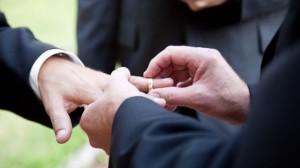By RACHEL ZOLL

The intensifying battle over gay marriage in the United States is energizing religious groups that oppose same-sex relationships–but also dividing them.
In June, the U.S. Supreme Court gave married gays and heterosexuals equal status under federal law, but did not declare a nationwide right for gays to marry, setting the stage for state-by-state decisions. So faith leaders are forming new coalitions and preparing for the legislative and courtroom battles ahead.
Yet, traditional religious leaders, their supporters and the attorneys advising them are divided over strategy and goals, raising questions about how much they can influence the outcome:
- Several religious liberty experts say conservative faith groups should take a pragmatic approach given the advances in gay rights. Offer to stop fighting same-sex marriage laws in exchange for broad religious exemptions, these attorneys say. “If they need to get those religious accommodations, they’re going to have to move now,” said Robin Fretwell Wilson, a family law specialist at the University of Illinois, Champaign-Urbana. Critics reject the idea as a premature surrender.
- Religious leaders lobbying for exemptions can’t agree how broad they should be. A major difference is over whether for-profit companies should qualify for a faith-based exception.
- Some religious liberty advocates and faith leaders are telling houses of worship they could be forced to host gay weddings, with their clergy required to officiate. The Louisiana Baptist Convention is advising congregations to rewrite their bylaws to state they only allow heterosexual marriage ceremonies, and the Alliance Defending Freedom, a religious liberty group that opposes same-sex marriage, is advising the same. But legal experts across a spectrum of views on gay rights say it can’t happen given strong protections for what happens inside the sanctuary under the First Amendment of the Constitution, which guarantees religious freedom.
The issue of accommodating religious opponents has already been a sticking point in legislative battles. In Rhode Island and Delaware, disputes over broader religious exemptions led to the failure of some same-sex union bills. Both states went on to approve civil unions in 2011, then same-sex marriage this year. In New York, gay marriage became law only after Gov. Andrew Cuomo and the state’s top two legislators struck an eleventh-hour compromise on religious exemptions.
Still, advocates for stronger religious protections haven’t won anything close to what they’ve sought in the 13 states and the District of Columbia where gay marriage has been recognized.
A few states have approved specific religious exemptions related to housing or pre-marital counseling, or benefits for workers in private, faith-based groups, such as the Knights of Columbus, a Catholic fraternal organization, according to analysis by Fretwell Wilson. Most of the states have protected religiously affiliated nonprofits from potential government penalty for refusing to host same-sex marriage ceremonies.
The only other protection written into the laws is a provision First Amendment scholars consider redundant: All spell out that clergy are exempt from performing same-sex ceremonies and can’t be sued for their refusal.
The overall result: a patchwork of regulation, with gaps that are likely to become the target of lawsuits.
The statehouse negotiations concern what, if any, exemptions religious believers should have in the public arena. Should a religious social service agency with government funding be required to legally recognize married same-sex couples in all circumstances? Should a congregation that makes money renting property to the public be required to allow gay wedding receptions in the space?
Some advocates go further, arguing religious accommodations should extend in some cases to individuals. In this view, owners of a neighborhood bakery that makes wedding cakes should be exempt. So too should the county clerk who issues marriage licenses, as long as someone else in the clerk’s office can step in easily and provide the service.
Many cities and states have anti-discrimination ordinances that include sexual orientation, setting up fines or other penalties for failing to comply. Absent an exemption, objectors may have to shut down their businesses or give up their jobs, religious leaders say. They argue losing your livelihood is too harsh a punishment for views on such a core religious issue as marriage.
But gay rights advocates say this argument puts too heavy a burden on gays and lesbians, and presents them with an unfair set of choices.
“In some states, the price of equality in marriage has been agreeing to give up protections against discrimination as part of the negotiations,” said Jenny Pizer, senior counsel for the gay rights group Lambda Legal. “In ways, I think, other politically vulnerable groups are not required to pay that price.”
Advocates for the exemptions don’t agree on where they should go from here.
Nathan Diament, policy director for the Orthodox Union, which represents Orthodox Jewish congregations and has been a prominent voice on religious liberty issues, said his group hasn’t taken a position on the religious rights of businesses or employers, but has advocated for broader religious exemptions for employees, such as a clerk who issues marriage licenses.
The U.S. Conference of Catholic Bishops, which in the last two years has made religious freedom a signature policy issue, believes any organization with faith objections, whether a for-profit corporation or a nonprofit agency, should be exempt.











Comments